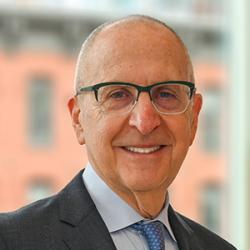David J. Skorton, MD, is president and CEO of the AAMC (Association of American Medical Colleges), a not-for-profit association that represents medical schools, academic health systems and teaching hospitals, and academic societies.
He began his leadership of the AAMC in July 2019 after a distinguished career in government, higher education, and medicine. Shortly after his arrival, Dr. Skorton oversaw a comprehensive strategic planning process that established a new mission and vision for the AAMC. It also introduced well-defined action plans to align the AAMC’s organizational resources to tackle the most intractable challenges in health. The strategic plan guides the AAMC in leading and serving medical schools and academic health systems around the mission areas of education, clinical care, research, and community collaboration.
Dr. Skorton engages with academic health system leadership and staff, medical students, residents, post-doctoral researchers, and interested community members through social media and the AAMC Communities virtual network. He speaks at medical school commencements, summits and seminars addressing the future biomedical research workforce, and other venues on a wide variety of topics, including the challenges facing academic medical centers and why now is such an important time to enter the field of medicine. His main focus is on improving the health of people everywhere, including access to care for all.
Throughout the COVID-19 pandemic, Dr. Skorton contributed to the national response through frequent interactions with senior government officials, national media appearances, and the development of a Road Map to Reset the Nation’s Approach to the Pandemic. He and other AAMC leaders and experts sounded the alarm on shortages of personal protective equipment in hospitals, testing shortages in academic laboratories, and the importance of respecting science and the scientific process in efforts to fight the pandemic.
Prior to assuming the helm of the AAMC, Dr. Skorton served as the 13th secretary of the Smithsonian Institution, where he oversaw 19 museums, 21 libraries, the National Zoo, and numerous research centers and education programs. Before that, he served as president of two universities: Cornell University (2006 to 2015) and the University of Iowa (2003 to 2006), where he also served on the faculty for 26 years and co-founded and co-directed the University of Iowa Adolescent and Adult Congenital Heart Disease Clinic. A pioneer of cardiac imaging and computer processing techniques, he was a contributor and editor-in-chief of a major text on cardiac imaging.
A distinguished professor at Georgetown University, Dr. Skorton is an elected member of the National Academy of Medicine, the American Academy of Arts and Sciences, and the American Philosophical Society. He is also a lifetime member of the Council on Foreign Relations and a fellow of the American Association for the Advancement of Science. He served on the AAMC Board of Directors from 2010 to 2013, and he was the charter president of the Association for the Accreditation of Human Research Protection Programs, Inc., the first group organized specifically to accredit human research protection programs.
A nationally recognized supporter of the arts and humanities, as well as an accomplished jazz musician and composer, Dr. Skorton believes that many of society’s thorniest problems can only be solved by combining the sciences, social sciences, and the arts and humanities.
Dr. Skorton earned his BA from Northwestern University and his MD from Northwestern University School of Medicine. He completed his medical residency and fellowship in cardiology and was chief medical resident at the University of California, Los Angeles. He is married to Robin Davisson, PhD, an award-winning scientist who is a professor emerita of molecular physiology at Cornell University and Weill Cornell Medical College, as well as an adjunct professor of medicine at Georgetown University and an emerging visual artist.
Media Appearances, Publications, and Speaking Engagements:
- PBS Newshour, February 2025, on the value of funding for the National Institutes of Health
- AAMC Leadership Plenary with Lee Jones, MD, and David J. Skorton, MD, 2024
- Award-winning commencement speech, Sidney Kimmel Medical College at Thomas Jefferson University, 2024
- Indiana University’s “Stephen P. Bogdewic Lectureship in Medical Leadership” Video: An Intimate Conversation with David J. Skorton, MD, 2024
- Stanford University’s “The Doctor’s Art” Podcast: Leading the Leaders of Medical Education, 2024
- The University of Texas Medical Branch’s “Faculty Factory” Podcast: Life Lessons in Informal Learning, Mentorship, and On-the-Job Education with David J. Skorton, MD, 2024
- “Your Call to Lead in Medicine and Beyond,” an award-winning commencement speech for the Medical College of Wisconsin, May 20, 2022
- “The Impact of Academic Medical Centers on Local Communities and Beyond,” University of Utah Health Library
- “AAMC leaders: Can academic medicine reduce health inequities?” with Alison Whelan, MD, and Henri Ford, MD, Inside U Miami Medicine
- “Health Care Leaders Speak Out on Climate Change,” National Academy of Medicine: Action Collaborative on Decarbonizing the U.S. Health Sector
- “At the crossroads: Addressing gun violence as a public health crisis,” AAMC News
- “America's COVID response is still badly flawed. Here's how to finally get it right,” co-authored with Atul Grover, MD, PhD, USA Today
- “COVID burnout: Demand on doctors could worsen shortage,” co-authored with Janis Orlowski, MD, MACP, USA Today
- “Why we need the arts and humanities to get us through the COVID-19 pandemic,” USA Today
